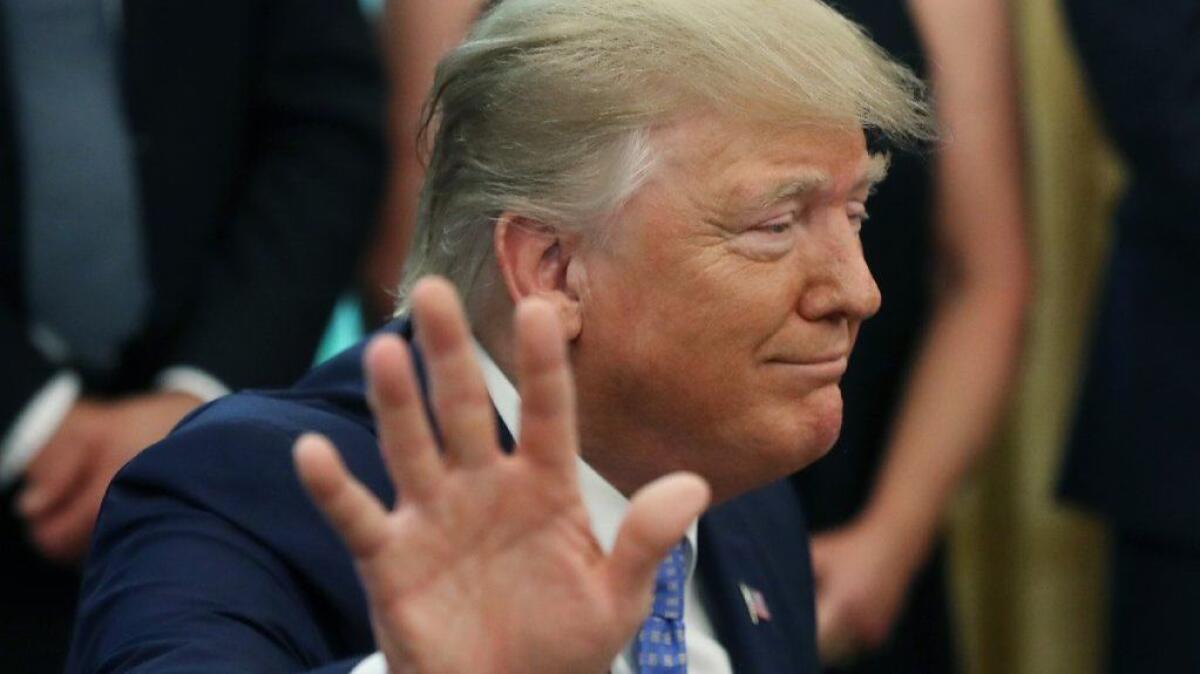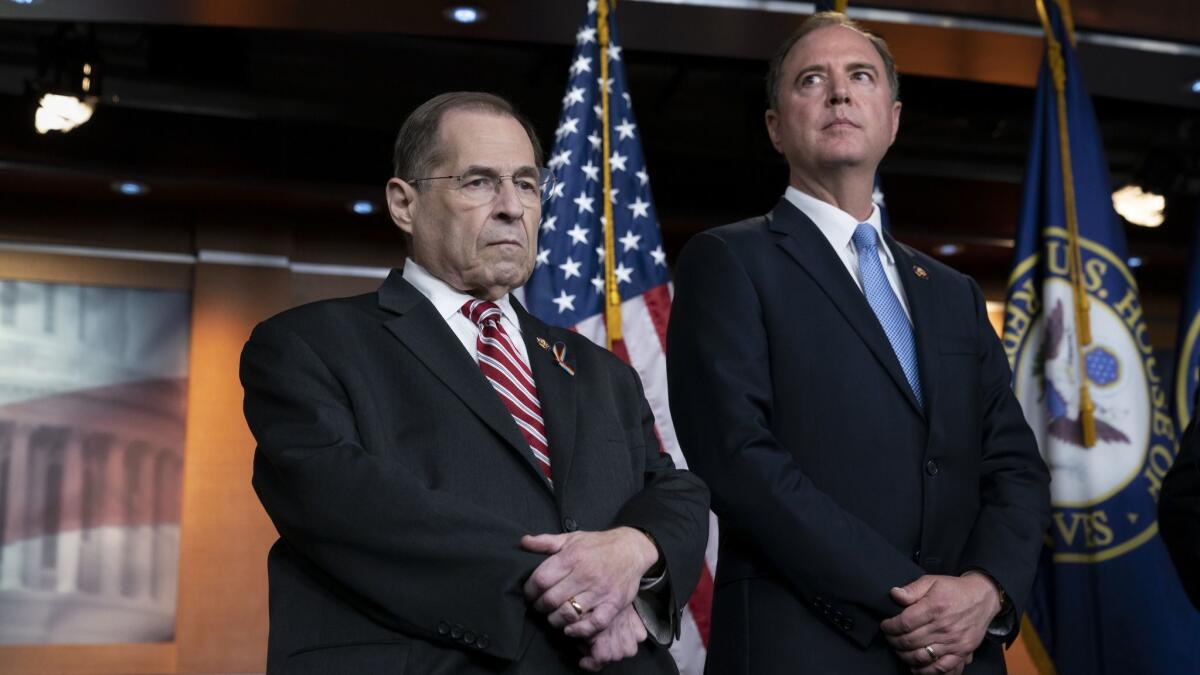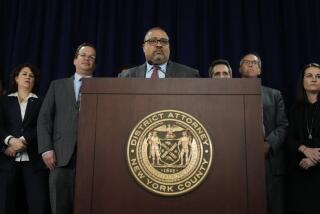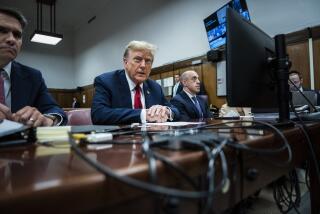Democrats set stage for Mueller extravaganza on Capitol Hill

- Share via
Reporting from Washington — Ever since special counsel Robert S. Mueller III finished the Russia investigation, Democrats have struggled to package the results of the probe into the kind of live television spectacle that captivated the country a generation ago during the Watergate scandal that doomed Richard Nixon’s presidency.
They’ve been handicapped by recalcitrant witnesses who have refused to testify and Mueller’s own report, which embeds damning evidence against President Trump in a legalistic 448-page document that refuses to present tidy conclusions.
Now Democrats’ fortunes may be shifting.
Mueller agreed to testify after being presented with a congressional subpoena, and he’ll appear publicly in two back-to-back hearings on July 17. He’s expected to speak first to the House Judiciary Committee, which has been focusing on Trump’s attempts to limit the Russia investigation, and then the House Intelligence Committee, which is examining Moscow’s covert attempts to influence the 2016 election.
“It’s very important for the public to hear from Mueller directly,” said Rep. Adam Schiff (D-Burbank), chair of the Intelligence Committee. “I don’t think we can operate under the expectation that every American has the time to read a 450-page report.”
Mueller did not want to testify, saying in his only public statement before stepping down as special counsel last month that he hoped such an appearance would not be necessary. Now he’ll be the star witness in hearings that could reshape voters’ views on Washington’s most closely watched saga.
“The very fact that his face is attached to the words makes it something that people will talk about,” said Todd Gitlin, a professor of journalism and sociology at Columbia University. He said hearings “color in the picture and make it three-dimensional.”
Mueller has pledged to restrict his testimony to the contents of his report, but congressional hearings can be unruly events with unexpected consequences. A stray comment by John Dean, Nixon’s former White House counsel, during his congressional testimony in 1973 helped investigators discover a secret taping system that eventually led to the president’s resignation.
“You’re looking at a lot of rocks being thrown in a pond, and a lot of ripples,” Gitlin said.

House Democrats have already begun strategizing about their questions — Rep. Madeleine Dean (D-Pa.) said she’s been earmarking pages in her copy of Mueller’s report — as they plan to guide the former special counsel to the most significant allegations from his investigation.
“That’s the key thing – to get him to amplify the contents of the report for all the pivotal junctures,” said Rep. Jamie Raskin (D-Md.), a member of the Judiciary Committee.
Democrats have tried to tamp down expectations for a blockbuster discovery at the same time they hope to draw renewed attention to the Russia investigation after months of faltering attempts to gain traction.
“Mueller’s appearance gives us a chance for a fresh start on the investigation front,” Raskin said.
The Russia case led to criminal charges against Trump’s former campaign chairman, national security advisor and longtime lawyer, among many others. Mueller said the evidence did not establish a conspiracy between Moscow and Trump’s campaign, but his report said the president’s team welcomed Russia’s covert effort to boost his candidacy with social media disinformation and hacked Democratic Party emails.
The report also laid out ways Trump tried to limit the Russia investigation, including an attempt to fire the special counsel himself. Mueller declined to say whether Trump broke the law by obstructing justice, citing Justice Department rules that prevent charging a sitting president.
Trump, a former reality television star, has been keenly aware of the prolonged attention that Mueller’s testimony would generate. He called into the Fox Business Network on Wednesday morning and complained that Democrats were continuing a “phony witch hunt” against him.
“I have been attacked for two and a half years with a phony, dishonest, crooked group of people,” he said.
Trump accused the Democrats of trying to distract from allegations he’s fanned that the Russia investigation was handled improperly.
“The reason they’re fighting so hard, they think it’s going to be revealed,” he said. “The real stuff. The real stuff is coming down.”
During the Fox Business interview, the president added a new, evidence-free allegation against Mueller — that the former special counsel violated the law by erasing text messages between Peter Strzok, a former FBI agent, and Lisa Page, a former FBI lawyer.
The two exchanged messages sharply critical of Trump while they were working on the Russia investigation, an episode that the president’s allies have used to suggest that authorities were biased against him.
“Robert Mueller terminated their text messages,” Trump said. “He terminated them. They’re gone. And that’s illegal. That’s a crime.”
Some messages were missing, but the Justice Department’s inspector general was able to recover thousands and did not accuse the special counsel’s office of any wrongdoing.
Republican lawmakers want to turn the hearings into a review of how the Russia investigation was conducted. They’ve been stockpiling a list of grievances, including allegations that Trump’s campaign was the target of improper surveillance, that they want the former special counsel to address.
Rep. Peter T. King (R-N.Y.), a member of the House Intelligence Committee, said he wanted a better chronology for the investigation.
“When did he find out there was no Russian collusion, and why did he keep the investigation going after that?” he said.
Given that the investigation ultimately did not establish a conspiracy between Moscow and Trump’s campaign, King said holding hearings with Mueller may not have the impact that Democrats want.
“This can easily backfire on them,” he said.
The testimony could have other unwanted consequences for Democratic leaders. Spending a full day with a star witness reviewing allegations against Trump could spur a renewed push for impeachment proceedings, something that House Speaker Nancy Pelosi (D-San Francisco) has resisted.
Mueller’s testimony could break the dam and allow “the floodwaters to flow on impeachment,” Rep. Gerald E. Connolly (D-Va.) said Wednesday. “It’s a very fragile situation.”
In an age of hardened partisanship, it’s unclear whether even Mueller’s hotly anticipated testimony has the power to significantly shift public opinion. Douglas Brinkley, a presidential historian, noted that the situation is much different from during the Watergate era, during which some Republicans worked with Democrats on congressional investigations into Nixon.
“We’re a divided country, and each side is going to take what they see from a different lens,” he said.
Nick Akerman, a former Watergate prosecutor, said it was congressional hearings even more than the criminal investigation that shaped public perceptions of Nixon. The Senate’s special Watergate committee, headed by Sen. Sam Ervin (D-N.C.), held lengthy, televised sessions to unspool wrongdoing within the president’s inner circle.
“The problem now is, the narrative is all buried in this 448-page report,” Akerman said. “What the committee has to do is put it in a logical comprehensive order.”
More to Read
Get the L.A. Times Politics newsletter
Deeply reported insights into legislation, politics and policy from Sacramento, Washington and beyond. In your inbox twice per week.
You may occasionally receive promotional content from the Los Angeles Times.












